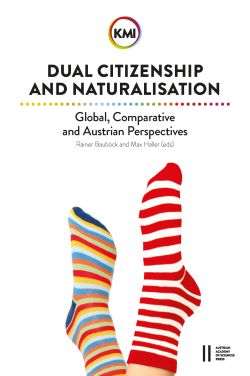Rainer BAUBÖCK - Max HALLER (Hg.)
Dual Citizenship and Naturalisation
Global, Comparative and Austrian Perspectives
Günther Pallaver,
Guido Denicolò
S. 183 - 204
Verlag der Österreichischen Akademie der Wissenschaften
doi:
10.1553/978OEAW87752_Chapt09
Abstract:
The discussion about dual citizenship in Italy was and is determined by a dominant theme. Primarily, this topic is related to questions of migration, in the sense of both emigration and immigration. After the Second World War, the problem of Italians in areas “lost in war” was added to this. Under these conditions, this chapter examines the case of Italy with a focus on the evolution of its citizenship law. Already in the first basic citizenship law of 1912 and although originally against dual citizenship, the young state wanted to maintain links with the large diaspora of Italian emigrants. Including Italians abroad as citizens across several generations was fully compatible with an ethno-cultural conception of national identity. Italy also permits the so-called italiani oriundi – i.e. persons of Italian ancestry living permanently abroad – to regain Italian citizenship if they can prove that none of their direct ancestors has explicitly renounced Italian citizenship. The second group of residents abroad for whom Italy promotes the restoration of citizenship are ethnic Italians in the neighbouring territories of Slovenia and Croatia, lost after World War II. Unlike for the italiani oriundi, these latter groups must establish a certain familiarity with the Italian culture and language. The final category discussed in the chapter are non-Italian immigrants whose numbers have been growing substantially since the 1990s. Although dual citizenship is tolerated in residence-based naturalisations, these are comparatively rare. Initiatives by the centre-left to introduce moderate forms of ius soli or ius culturae (naturalisation based on years of schooling) for the second generation have not thus far been successful.
2021/05/05 12:51:38
Object Identifier:
0xc1aa5576 0x003c7000
Rights:All rights reserved.For questions regarding copyright and copies please contact us by email.
The toleration of dual citizenship has become a global trend as states try to retain ties to their emigrants or to encourage their immigrants to naturalise. This volume examines changes in state attitudes to dual citizenship and their social impact, zooming in from analyses of global dynamics to a series of country case studies that illustrate the variety of reasons and intentions behind dual citizenship reform. Finally, five chapters provide the most thorough analysis of the special Austrian case so far. They show the size of Austria’s untapped potential for naturalisation of immigrants, the incoherence of its citizenship policies at home and abroad and the need for a comprehensive reform.
…
Die Duldung der doppelten Staatsbürgerschaft ist zu einem globalen Trend geworden, weil Staaten versuchen, die Bindung zu ihren Auswanderern aufrechtzuerhalten oder ihre Einwanderer zur Einbürgerung zu ermutigen. Dieser Band untersucht diese Änderungen der staatlichen Haltung und ihre sozialen Auswirkungen. Er beginnt mit Analysen der globalen Dynamik und fokussiert anschließend auf Länderfallstudien, die die verschiedenen Gründe und Absichten hinter Reformen der Doppelstaatsbürgerschaft veranschaulichen. Abschließend bieten fünf Kapitel die bislang gründlichste Analyse des österreichischen Sonderfalls. Sie zeigen die Größe des ungenutzten Einbürgerungspotenzials in Österreich, die Inkohärenz seiner Staatsbürgerschaftspolitik gegenüber Ein- und Auswanderern und die Notwendigkeit einer umfassenden Reform.




 Home
Home Print
Print
 References
References
 Share
Share
